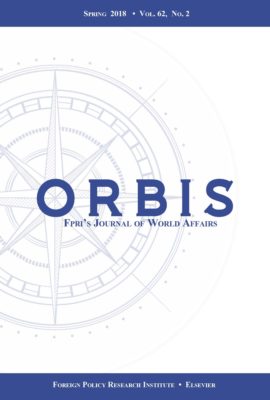A nation must think before it acts.
Announcing the 2018 Spring Issue of Orbis, FPRI’s Journal of World Affairs
Mac Owens is Editor of Orbis: FPRI’s Journal of World Affairs, and Senior Fellow in our Program on National Security. Orbis is published for the Foreign Policy Research Institute by Elsevier. For subscription or other information, visit the Elsevier website. FPRI members at the $150 level or above receive a complimentary subscription (for individuals, not institutions). For membership information, please click here. To view this issue online, please click here.

Next, the renowned naval historian, John Maurer of the Naval War College, draws parallels between the contest for naval mastery during the Great War and today, in that the United States now faces the same sort of challenge from China that Great Britain did from Germany in the period leading up to the conflict. The stakes at risk for the United States in today’s contest are just as high as they were a century ago for Britain. Defeat at sea would wreck American global leadership in the twenty-first century just as surely as it would have meant the collapse of British power in the twentieth. What, then, can we learn from past struggles for sea power and America’s entry into the First World War that offers guidance for understanding our current strategic predicament?
Our third article by Mamuka Tsereteli addresses Russia’s quest for leadership within the post-Cold War European order. The author argues that Russia is attempting to change “realities on the ground” by limiting the sovereignty of the countries in what it considers to be its sphere of influence and preventing its penetration by Western hard and soft power
Andrew W. Marshall, the first Director of Net Assessment for the Department of Defense, and Abram N. Shulsky, a longtime defense analyst, examine the case of the Soviet Union in describing the difficulties associated with determining the sustainability of command economies and totalitarian regimes. The fact was that the U.S. intelligence agencies were never able to determine with any degree of certainty the real size and health of the Soviet economy. Since the United States undoubtedly will continue to face adversaries in the future with similarly opaque command (or mixed command and free market) economies, the problem is likely to arise again. The authors, based on their assessments of failures in the Soviet case, offer some suggestions to improve the assessments of the size and health of such opaque economies.
Artyom Lukin and Liudmila Zakharova note that Russia’s relations with North Korea are often ignored in the West. In fact, Russia maintains a range of economic links with the Democratic People’s Republic of Korea, which taken together, constitute substantial leverage that Russia can exercise over North Korea, when and if it chooses to do so. The authors focus on the economic dimension of the Russia-North Korea relationship.
Peter Campbell examines the claim that in cyberspace, the offense holds the advantage at both either the tactical or the strategic level. Turning to two unexpected sources—official statements of U.S. Army doctrine and Carl von Clausewitz’s On War—he concludes that a defensive doctrine has clear advantages over an offensive one.
Tianchi Wu notes that the utility of land power is not diminishing, but that the traditional employment of land power, as in Vietnam, Iraq, and Afghanistan, has tended to exhaust domestic political will necessary to sustain it over time. He argues that the answer to the dilemma of land power, however preliminary, focuses on time and lies at the nexus of strategy and cost.
Kim Cragin and Ari Weil examine a recent innovation by the Islamic State (IS) in its global campaign of terrorism: the use of virtually planned attacks, which are a response to U.S./allied successes in reducing the ability of IS to send foreign fighters home to conduct attacks against the West. Historically, virtually planned attacks in Europe and the United States have not been as successful as those executed by foreign fighters. But attacks in Southeast Asia may provide a forewarning of what is to come.
Karl E. Nell contends that the disengagement of U.S. leadership in recent years has not only emboldened the world’s worst actors, but it also has enabled the emergence of non-state groups such as the ISIS, which threatens a new and ominous trend in international affairs—the pursuit of sovereign authority by transnational violent-extremists. The author proposes the “Doctrine of Contingent Sovereignty,” the idea that the privilege of sovereignty remains contingent upon adherence to accepted international norms of behavior. Such a doctrine provides the requisite tools for bolstering the legitimacy of weakened states while simultaneously affording the necessary freedom-of-action for the United States to secure its vital national interests
And, finally, in our book review, Ben Silberstein reviews two books exploring North Korea; and Thomas Cavanna assesses two books on China.




